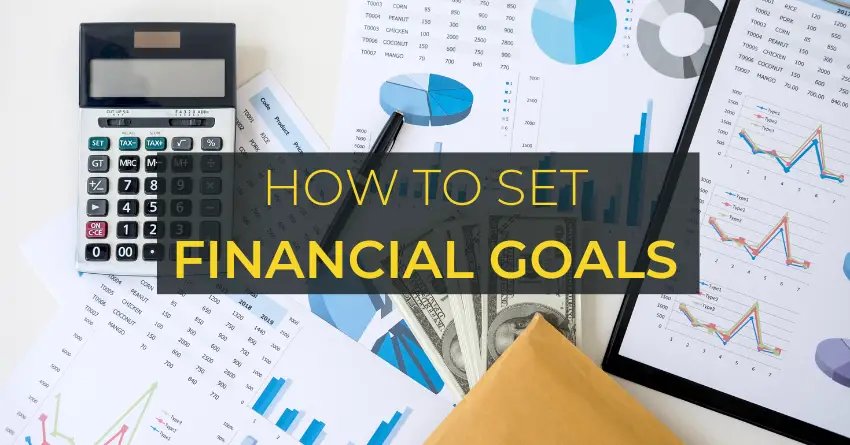One of the lessons I learned during the pandemic is that crises come at very unexpected times, places, and circumstances. With that, planning and preparing for the worst-case scenario is crucial.
When it comes to money, setting financial goals can help you become financially secure much faster, which enables you to handle some of life’s major risks.
With a financial goal in place—something that is specific and has a deadline—it is easier to achieve your target. It allows you to measure your progress and see how far you have come in achieving your goals.
Table of Contents
What is a financial goal?
A financial goal is a target or objective that you set for yourself concerning your financial situation. This can be anything from saving a certain amount of money to paying off debt, investing in certain assets, or creating a budget to better manage your finances.
5 Examples of Personal Finance Goals
There are many different types of financial goals that you can set for yourself. Here are some common financial goals that you can add to your list.
Building an Emergency Fund
I wrote a separate blog post about what an emergency fund is and how to create one. You can check out the article here.
In a nutshell, an emergency fund is a savings account that you can use to cover unexpected expenses, such as medical bills. In my last blog post, I shared how I was able to pay for an unforeseen hospital bill using the money I saved up for my emergency fund.
Now, I personally recommend that you make this goal your priority, regardless of your financial situation. It’s so comforting to think that you have spare funds to use whenever an emergency comes.
Paying off Debt
If you are like me and hate borrowing money from other people unless you need it, this goal might not be for you.
However, if you have high-interest debt, such as credit card debt, it may be a good financial goal to focus on paying it off as quickly as possible. Nothing feels more comfortable than knowing that you don’t owe anyone anything.
Putting Money Aside for Travel
Last October, I had the chance to travel overseas for a week. It has been one of my dreams to visit other places outside my home country, and achieving it is SO heavenly.
Aside from being able to rest from my daily job, seeing the beauty of other places, and having a taste of the delectable local food, traveling has also made me more determined to save up for my next travel adventure.
And yeah, if you wish to travel, then you should save up for it.
Buying a Home
Since I started working, one of my monthly expenses is paying rent on my apartment. Though the lease is not that much, it is still something that can be avoided if I have my own home.
Buying my own home is one of my personal financial goals. It is a long-term goal, which in my situation now would take a few years, but adding it to my list reminds me every day of what I should be doing to achieve it.
If you are renting your place and you don’t like it, then consider homeownership as one of your financial goals.
Spend Less, Save More
Being intentional about your money, which could mean spending less and saving more, is something that a lot of people (including me) forget to add to their financial goals.
However, if you want to be financially secure, then this objective is important to implement in your daily life.
Steps to Setting Financial Goals
It doesn’t matter how many financial goals you set for yourself. The most important thing is that you know what you want and why you want to achieve a certain target. Here are a few steps on how you can set new money goals.
Determine your Current Financial Situation
Before setting financial goals, it’s necessary to have a clear understanding of your current financial situation. This includes your income, expenses, debts, and assets. Knowing where you stand financially will help you make more informed decisions about your goals and how to achieve them.
Make Your Goals Specific and Measurable
As I mentioned at the beginning of this post, working on something specific makes it easier to achieve. And when it comes to determining your financial goals, you should also make them as specific as possible.
For example, if you choose to build your emergency fund, then set aside a specific amount you need. For example, if your monthly expenses amount to $500, you should aim to have at least $1500 in your emergency fund, which is 3 months of your living expenses.
Set Deadlines for your Goals
Let’s use the same example as above.
When do you want to save up a total of $1500? If you want to achieve that goal in the next 6 months, you need to set aside $250 monthly.
You have to note, though, that the deadlines for your goals should be reasonable yet challenging. You don’t want to be discouraged when you fail to achieve a target because of a tight deadline, nor do you want to feel lazy about achieving it because you gave it a too-stretched time limit.
Track your progress
It’s important to regularly track your progress toward achieving your financial goals. This will help you stay on track and make any necessary adjustments to your plan.
Let’s say you fell short of saving up $50 this month for your emergency fund. Being aware of that would help you take actionable steps to earn more the following month to make up for that $50.
You can consider using tools such as a Google spreadsheet to keep track of your progress.
Celebrate your accomplishments
When you reach a financial goal, it’s important to celebrate your accomplishment.
Celebrating your achievements helps to recognize and appreciate the hard work and effort that went into achieving a goal. This can boost your morale and encourage you to continue striving for success.
A simple reward, such as purchasing ice cream, is one way to celebrate. It’s one thing I do for myself.
Final Thoughts
Setting financial goals is important in managing your personal finances and achieving financial stability.
By setting specific, measurable, achievable, relevant, and time-bound (SMART) goals, you can work towards improving your financial situation and reaching your financial aspirations.
It is important to remember that setting financial goals is an ongoing process. And that it’s critical to review and adjust your goals as your circumstances change and you make progress toward them.
We at EarnCredibles wish you good luck in planning and achieving your money goals this 2023





4 Comments
Frankie Bridge
January 29, 2023 at 7:25 AMYour writing skills are amazing! Please also visit my website : https://garminexpress.global or you can open it via link : https://tinyurl.com/2q3bxqxk , you will learn so many things from there 🙂 Thankyou!
Frankie Bridge
February 4, 2023 at 11:17 PMHi! Just wondering- what template did you use for your website? I want to use it on my blog at https://garminexpress.global
Jomel
April 12, 2023 at 12:13 AMHi Frankie, I use the Aden WordPress theme.
Frankie Bridge
February 6, 2023 at 4:02 AMI really like your writing style..Its so easily understandable. You can visit my blog at https://garminexpress.global and then maybe you can share your thought about mine.